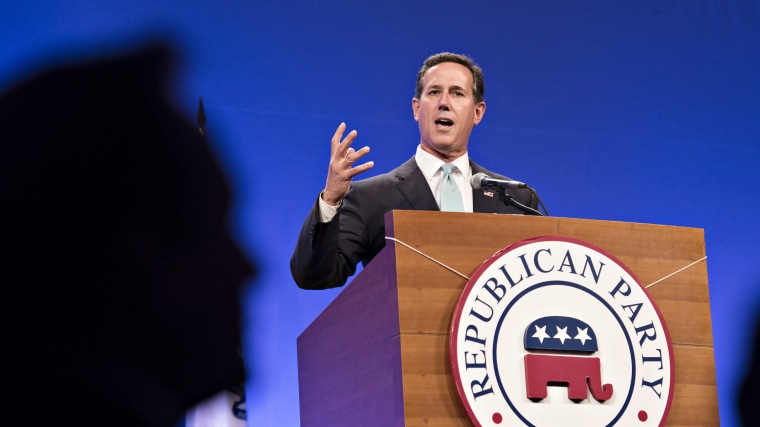At the Republican National Committee's spring meeting two weeks ago, former Sen. Rick Santorum (R-Pa.) was eager to remind party activists that over the last half-century, Republicans have nominated just three types of people for president. "No. 1, they were a vice president. No. 2, they were the son of a former president," Santorum said. "No. 3, they came in second place the election before, and ran again."
For Santorum, it was a self-serving observation -- he arguably came in second in 2012, winning 11 primaries and caucuses -- which happened to be true. If Republicans regularly turn to the "next in line" candidate, the former Pennsylvania senator has reason for optimism.
But realistically, that optimism is almost certainly misplaced. This report from NBC News' Perry Bacon Jr. rings true.
In the early stages of the race, key party officials and donors have bypassed Santorum to back other candidates, particularly ex-Florida Gov. Jeb Bush, Florida Sen. Marco Rubio and Wisconsin Gov. Scott Walker. In Iowa, where Santorum won in 2012 after visiting all 99 counties, some of his key backers in 2012 are already defecting to other candidates, particularly Texas Sen. Ted Cruz and former Arkansas Gov. Mike Huckabee. Santorum, despite finishing second in 2012, is so low in national polls right now that he may be excluded from a debate Fox News is hosting in August.... That low standing suggests he built little of a national following during this 2012 campaign.
I re-read this morning the piece I wrote when Santorum quit in 2012, and I was reminded of his improbable success. The former senator, who suffered a humiliating re-election defeat in 2006, parlayed failure into an unfocused, underfunded national campaign that managed to win quite a few states in spite of itself.
But in hindsight, we can now say with confidence that Santorum's success was something of a mirage -- lingering far-right skepticism about Mitt Romney led conservatives to look for an alternative who occasionally spoke in complete sentences. Santorum fared pretty well, not because of his competence as a national candidate, but because he was a warm body not named Mitt Romney.
Four years later, as Republicans grow the largest major-party presidential field in American history, rank-and-file GOP voters have all kinds of choices -- and they've shown absolutely no interest in the former Pennsylvania senator whom they got to know pretty well the last time around.
Santorum has developed a well-deserved reputation as a culture warrior, which also helped in 2012 when he was largely alone in reaching out to social conservatives, but he'll obviously have considerably more competition this time around.
Indeed, it's hard to even imagine the circumstances that will allow Santorum to compete in this contest. He'll have to somehow improve his national standing well enough to compete in televised debates, then somehow convince Iowa conservatives to overlook more credible suitors, then somehow find wealthy benefactors willing to take a chance on his longshot candidacy, and then somehow persuade the party mainstream that he's not a factional candidate.
By most fair measures, it doesn't seem like a likely scenario.
Santorum's announcement is scheduled for 5 p.m. eastern. He'll be the seventh candidate to officially enter the race, following, in alphabetical order, Ben Carson, Ted Cruz , Carly Firorina, Mike Huckabee, Rand Paul, and Marco Rubio.
